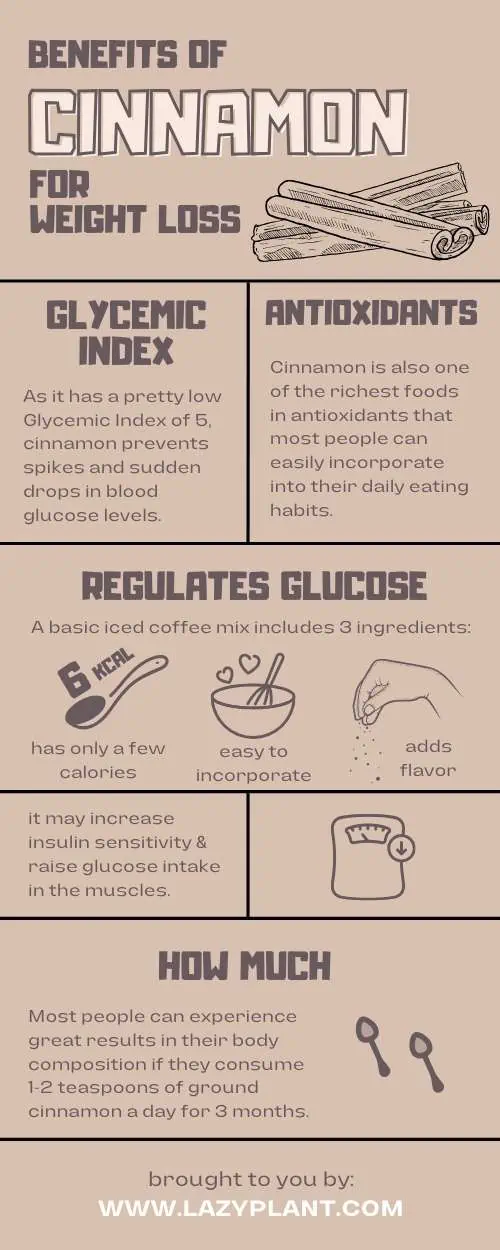Including 1-2 teaspoons of cinnamon in your daily intake, as part of a nutritious, low-calorie diet, supports weight loss. Among other health benefits, cinnamon increases insulin sensitivity, raises glucose intake in the muscles, increases glycogen storage, fights oxidative stress, and adds sweetness and flavor to countless dishes with only a few calories.
Cinnamon lowers the glycemic index of the meal
Firstly, sprinkling cinnamon to carbohydrate-rich foods plays a significant role in the total glycemic index of the meal.
In fact, cinnamon has a particularly low glycemic index. It’s close to 5.
On the contrary, food high in carbs are a pretty high glycemic index. Hence, they cause sudden spikes and drops of blood glucose levels. This is bad for weight loss, though.
These spikes cause cravings. Snacking can destroy a hypocaloric diet. It can lead to overeating which makes you fat.
Glycemic index of oatmeal
For comparison, oatmeal has a medium glycemic index of 66.[1]
Although whole-grain oats are high in carbs, they won’t spike blood sugar levels because they have decent amounts of fiber and protein!
Instant oats may have a higher glycemic index, though. Especially if the brad has been removed. In this case, it’s vital to sprinkle some cinnamon on the bowl before consuming it.
However, oatmeal can significantly reduce acute postprandial glucose and insulin responses as compared to other meals high in carbs.
Thus, according to studies, eating reasonable amounts of oats seems beneficial for people with type 2 diabetes. They may help them control glucose levels.[2]
Certainly, you should consult your physician before changing your diet.
Does cinnamon really speed up your metabolism?
Cinnamon is often suggested to have a mild metabolic-boosting effect. But it probably has a low impact on metabolism.
While there is some evidence supporting the potential metabolic benefits of cinnamon, the effects are generally modest, and more research is needed to establish clear conclusions.
Responses to cinnamon can vary among individuals. Factors such as genetics, overall diet, and lifestyle may influence how someone responds to cinnamon in terms of metabolism.
According to a recent study among 786 participants, cinnamon administration significantly decreased body weight. In addition, it helped overweight people decrease waist circumferance and body mass index.[3]
A small daily dose of 2 grams (almost a teaspoon) as part of a healthy diet is enough to help you reduce your body fat percentage!
How long does it take for cinnamon to burn belly fat?
Research has indicated that consuming cinnamon for three months can lead to a reduction in body fat percentage. Positive effects may potentially be observed in a shorter duration.
If you’re not fond of the taste of cinnamon, you might consider taking cinnamon supplements.
You’ll find a wide variety of dietary supplements at unbeatable prices on iHerb.com
Can Cinnamon make refined foods rich in carbs healthy?
Cinnamon can regulate blood glucose levels after a meal. It is a natural insulin stimulant.[4]
Moreover, cinnamon may increase insulin sensitivity, raise glucose intake in the muscle, and increase glycogen storage by affecting glycogen synthesis!
These effects are very beneficial for athletes. Higher glycogen stores can improve athletic performance while faster replenishment of lost glucose substantially accelerates recovery.
However, we should consume lots of foods with a low glycemic index while dieting. Not only do they support weight loss, but they also play a beneficial role in overall health.
Cinnamon itself doesn’t transform refined foods rich in carbs into inherently healthy options. It only offers some potential benefits when added to such foods.
Do antioxidants in Cinnamon affect belly fat burn?
Cinnamon is one of the richest foods in antioxidants that most people can easily incorporate into their daily eating habits.
While it won’t make refined carbs healthy on its own, the antioxidants could offer a positive aspect.
Eating foods high in antioxidants as part of a low-calorie, well-balanced diet could play a role in weight management, though. Antioxidant compounds fight chronic low-grade oxidative stress which is another factor of obesity.

Antioxidants in cinnamon don’t burn belly fat per se, but they protect the body from the dangerous compounds that are produced from active body fat.
Adipose tissue isn’t just an inert tissue that stores fat. It’s responsible for the synthesis and secretion of several hormones.[5]
These hormones are important for dealing with obesity, as they control appetite and sensitivity to insulin!
Spices and herbs are the richest foods in antioxidants. Vegetables and fruits are also excellent dietary sources.
Cook healthy recipes with Cinnamon
In addition, cinnamon adds natural sweetness and flavor, allowing you to enjoy the taste of the food without needing to add extra sugar or other natural or artificial sweeteners.
After all, cinnamon has only a few calories. A teaspoon of ground cinnamon has only 6 calories. A tablespoon has 19 calories![6]
How much cinnamon should I eat a day?
In fact, 6 grams of cinnamon a day with a high-carbohydrate meal can reduce postprandial blood glucose, delay gastric emptying, and have positive effects on reducing oxidative stress.[7]
This is about 2 teaspoons. This dosage should be the maximum safe intake for most people. There isn’t enough data to back up the safety of the consumption of larger quantities long-term.
Much higher dosages for a long time might cause stomach discomfort in certain cases.
Even sprinkling half a teaspoon on your oatmeal could be beneficial for weight loss and overall health, though.
Benefits of adding cinnamon to recipes after cooking!
Adding cinnamon to food after cooking, especially when focusing on weight loss, can offer several benefits.
Above all, cinnamon contains antioxidants, and some of these may be sensitive to heat. By adding cinnamon after cooking, you may preserve more of its antioxidant content.
Moreover, the sweetness and aromas of cinnamon are stronger if it’s added right before serving.
Adding cinnamon after cooking allows for more flexibility in incorporating it into various dishes. You can sprinkle it on oatmeal, yogurt, fruit, or even savory dishes like roasted vegetables.
Furthermore, as individuals have different taste preferences, adding cinnamon after cooking allows people to customize the amount of cinnamon flavor according to their liking.
How to incorporate cinnamon to your daily eating routine?
Here are 12 easy and creative ideas to incorporate cinnamon into your diet plan for weight loss:
- Cinnamon oatmeal: Sprinkle cinnamon on your morning oatmeal for added flavor without extra sugar.
- Cinnamon tea: Stir in a pinch of cinnamon into your morning coffee or tea for a warm, aromatic touch.
- Cinnamon smoothie: Blend cinnamon into your favorite smoothie for a delicious and spicy kick.
- Cinnamon apples: Bake apple slices with a dusting of cinnamon for a sweet and nutritious snack.
- Cinnamon nut butter: Mix cinnamon into almond or peanut butter for a tasty spread on whole-grain toast.

- Cinnamon roasted vegetables: Toss sweet potatoes, carrots, or squash with cinnamon before roasting for a savory side dish.
- Cinnamon rice pudding: Make a healthier rice pudding by adding cinnamon and using brown rice.
- Cinnamon trail mix: Sprinkle cinnamon on a mix of nuts and seeds for a flavorful trail mix.
- Cinnamon Sweet Potato Fries: Bake sweet potato fries with a sprinkle of cinnamon for a delicious side dish.
- Cinnamon Baked Pears: Bake halved pears with cinnamon for a warm and comforting dessert.
- Cinnamon popcorn: Sprinkle cinnamon on air-popped popcorn for a tasty and low-calorie snack.
- Cinnamon vegetable stir-fry: Add cinnamon to a vegetable stir-fry for a flavorful twist.
Cinnamon with protein-rich foods
- Cinnamon quinoa: Cook quinoa with a dash of cinnamon and serve as a base for salads or bowls.
- Cinnamon chia pudding: Mix chia seeds with almond milk and cinnamon for a nutritious and satisfying pudding.
- Cinnamon yogurt parfait: Layer yogurt with sliced fruits and a sprinkle of cinnamon for a healthy and satisfying parfait.
- Cinnamon cottage cheese: Mix cinnamon into cottage cheese for a protein-packed snack.
Keep in mind that quinoa and chia seeds are among the few plant-based foods with complete protein.
Oatmeal isn’t complete protein. You could prepare it with overnight-soaked oats, chia, or quinoa, though.
On the other hand, all animal foods have all essential amino acids.
Why should I eat cinnamon with protein-packed foods?
Combining cinnamon with protein can offer several potential benefits for weight loss. Firstly, when paired with protein, cinnamon may contribute to better blood sugar control, reducing post-meal spikes and promoting a more stable energy level.
Protein is well-known for its ability to promote feelings of fullness and satisfaction. Combining protein with cinnamon may enhance these satiety effects, helping you feel fuller for longer periods and potentially reducing overall calorie intake.
Moreover, protein has the highest thermic effect among macronutrients. About 20-30% is burned during digestion.
Also, protein is crucial for muscle preservation during weight loss. Combining protein with cinnamon in meals may support muscle maintenance while promoting fat loss.
When should I eat foods rich in carbs & cinnamon for Weight Loss?
The timing of when you eat foods rich in carbs with cinnamon can depend on your personal preferences, daily schedule, and overall dietary patterns. As long as you consume fewer calories than you burn, you can lose body weight and burn belly fat.
For instance, enjoying a snack with carbs and cinnamon between meals can be a flavorful and satisfying option. As long as you consume reasonable amounts.
However, consuming foods rich in carbs with cinnamon earlier in the day may be preferred for weight loss.

A healthy cinnamon snack for breakfast provides you with sustained energy throughout the day. This can be particularly beneficial if you have an active lifestyle or if you need energy for work or physical activities.
Moreover, the body has improved insulin sensitivity in the morning. It metabolized carbs as muscle glycogen.
Oats with cinnamon are a great pre- and post-workout meal as well.
On the contrary, we store less efficiently carbs as muscle glycogen late at night. Hence, if you eat too many carbs before bed, you’re more likely to store them as belly fat.
Also, limiting large meals, especially those high in carbs, close to bedtime can help prevent potential disruptions in sleep and overconsumption.
When should I take a tsp of cinnamon or supplements?
The timing of cinnamon consumption can depend on your personal preference and health goals.
Some people prefer to take cinnamon before meals, as it may help regulate blood sugar levels and reduce the post-meal rise in blood glucose. This is particularly relevant for individuals concerned about insulin sensitivity and managing blood sugar.
Others choose to include cinnamon with or after their meals. Adding cinnamon to dishes or beverages after the meal can contribute to the overall flavor and may be more convenient for those who find it challenging to take supplements on an empty stomach.
When can cinnamon make me fat?
Cinnamon itself is a low-calorie spice, and including it in your diet can’t directly make you fat. However, certain factors or practices associated with cinnamon consumption might contribute to weight gain.
For instance, if you consume cinnamon in dishes or beverages that are high in added sugars, the overall calorie and sugar content of the meal could contribute to weight gain.
Pairing cinnamon with high-calorie or unhealthy ingredients, such as excessive amounts of butter, cream, or sugary syrups, can definitely lead to obesity.
Cinnamon foods that aren’t good for Weight Loss
Although cinnamon helps regulate blood sugar levels, adding it to high-calorie recipes won’t play a significant role in weight management.
We gain weight when we consume more calories than we burn.
So, better avoid or consume small portion sizes of your favorite cinnamon bakery products:[8]
- cinnamon bread has 253 calories per 100g or 71 calories per a medium slice.
- muffins with raisins and cinnamon have 240 calories per 100g. A muffin has 137 calories.
- bagels have 274 calories per 100g. A bagel has up to 360 calories!
- cinnamon rolls has 403 calories per 100g. They have 100 calories each!
Cinnamon is often marketed as a healthy ingredient to fattening foods. If you’re dieting for a lean body, treat these foods as a calorie-dense snack or a sweet that only sparingly should be eaten.
Which cinnamon variety is better for Weight Loss?
Both Ceylon cinnamon and Cassia cinnamon are commonly used varieties, and both can be incorporated into a weight loss plan. However, there are some differences between the two.
Ceylon Cinnamon is known as “true” or “real” cinnamon. It’s generally considered to be of higher quality. It has a milder, sweeter flavor compared to Cassia cinnamon and contains lower levels of coumarin, a compound that may be harmful in high doses.
Cassia Cinnamon is more commonly found in grocery stores and used in many cinnamon supplements. It has a stronger, spicier taste compared to Ceylon cinnamon. Moreover, it contains higher levels of coumarin, which, in large amounts, may have negative health effects.
Both varieties of cinnamon can contribute to weight loss benefits, and the choice between them often comes down to personal preference. If you prefer a milder, sweeter flavor, you may opt for Ceylon cinnamon. If you enjoy a stronger, spicier taste, Cassia cinnamon might be your preference.
Who should avoid cinnamon?
While cinnamon is generally safe for most people when consumed in moderate amounts (up to 2 tsp a day) as part of a balanced diet, certain groups of individuals should exercise caution or avoid excessive consumption of cinnamon.
These include people with coumarin sensitivity. Cassia cinnamon contains higher levels of coumarin, which in large amounts may have negative health effects, including liver damage. Individuals with liver conditions or sensitivity to coumarin should choose Ceylon cinnamon or use cinnamon in moderation.
Excessive intake of cinnamon supplements, particularly Cassia cinnamon, may have uterotonic effects and, in rare cases, could potentially lead to complications during pregnancy.

Cinnamon has mild blood-thinning properties, and consuming large amounts may increase the risk of bleeding, especially for those already taking anticoagulant medications.
While rare, some individuals may be allergic to cinnamon. Allergic reactions can range from mild skin irritation to more severe symptoms.
If you have specific health concerns or conditions, it’s advisable to consult with a healthcare professional before making significant changes to your diet or using cinnamon supplements.
Why should I eat oatmeal with cinnamon while dieting?
Oats are rich in beta-glucose
Additionally, oats are an excellent dietary source of beta-glucan. Beta-glucan is a component that reduces glucose and insulin responses after a meal. Also, beta-glucan improves insulin sensitivity, helps overweight people lose weight, and decreases Body Mass Index (BMI).
We should get at least 3 grams of beta-glucose a day.
Moreover, you could add blueberries on top of your oatmeal. When anthocyanins and beta-glucose are combined, they promote satiety. So, you could eat oatmeal with cinnamon and blueberries to lose weight, without feeling hungry!
Oats are rich in GABA
Actually, oats are among the richest foods in GABA. GABA is a chemical that seems to regulate blood glucose and reduce insulin resistance.
